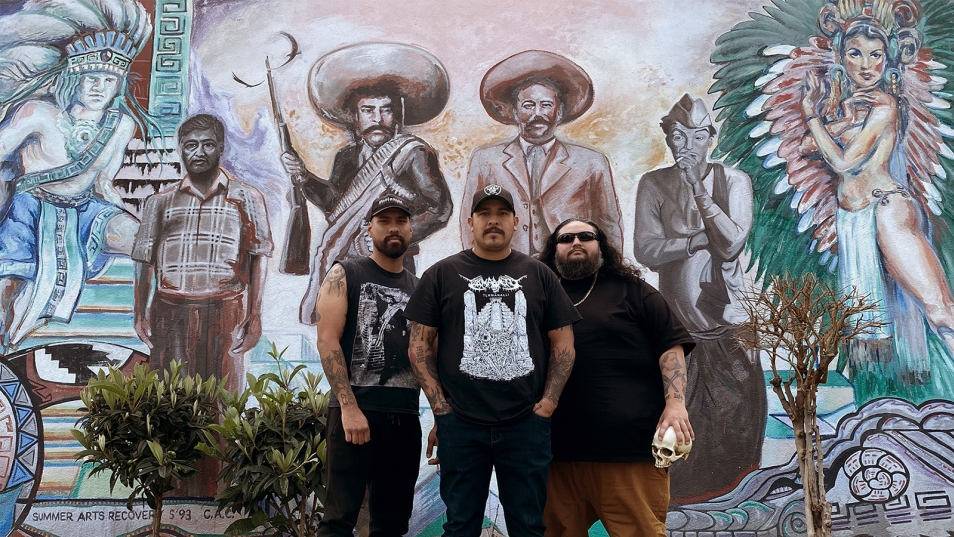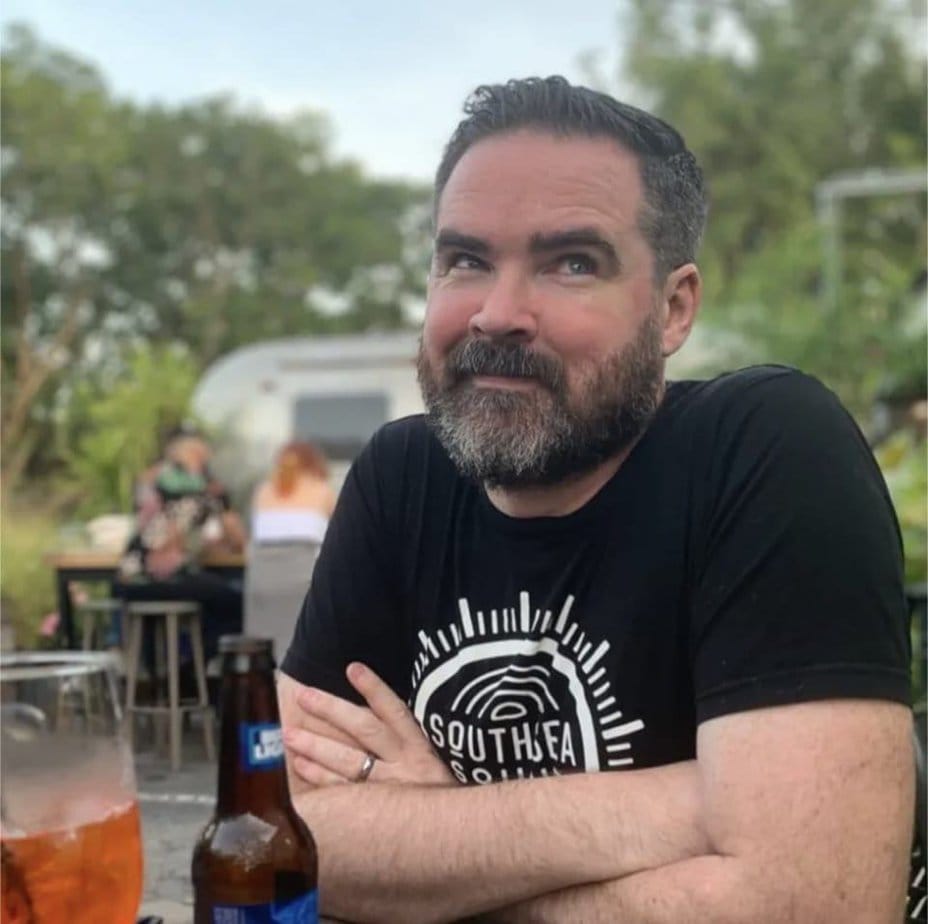Fucking Xibalba man. Don’t try to be heavier than Xibalba because you can’t. – Max Cavalera
Ten years on from their self titled debut’s mix of hardcore and doom, Xibalba have finally made the transition to a full on death doom band with the release of their new record, Años En Infierno.
I spent some time with guitarist Brian Ortiz, talking about metal, throwing away guitar strings, and the diversity of California’s hardcore and metal scenes.
KGR: I have read you guys were going on hiatus. Did you know that going into recording the record and did that have any bearing on recording what could potentially be the last statement of the band?
Brian: We’re actually not going on like a “hiatus, hiatus” – not like a true hiatus like we’re like we stop playing like, we’re just going to slow down a lot. We already have ideas for like new songs coming up that me and my drummer have been talking to each other (about).
And even though we haven’t played music since we did our livestream, the past couple of weeks, we’ve been shooting ideas at each other and stuff like that. So like I haven’t picked up my guitar since then, but I’m definitely getting the itch back.
But we’ve been slowly trying to take things like slower and slower over the past couple of years, but this time,we’re just going to do everything a lot more slower to basically make things a little bit more exclusive just because we can’t really take the time because of work priorities and shit – but that’s the main thing is just work life, family life.
Plus we all have other projects, not so much music product projects, but things that that we have outside of our work life and family life.
So we’re trying to just get to a spot where we can comfortably juggle all of that shit at one time so we’re not stressing ourselves out, and it’s still make time for our family which is our biggest priority – work and family, just being able to provide you know.
But we’re just going to take it slow and if there’s an offer that we can’t refuse so to speak then you know, we’ll take it, but for now we’re just trying to focus on what’s important – not saying that the band’s not important but just like I said family. Family’s the biggest thing because when you go on the road for 10 years, and then you know, you make these appearances and stuff it does like kind of get in the way of certain family things, like graduations, birthday parties, all that stuff.
So we’re putting our family and our own well being first before the band, but like I said, we’re still bouncing ideas off of each other because that shit’s just never going to leave us. Music’s always going to be a huge part of us. Me and Jason and Nate, we constantly throw ideas at each other, we’re constantly showing each other ideas and showing each other like, I always send them riffs.
Plus we just have a chemistry that’s been there since day one. So it’d be foolish to you know, give that shit up.
KGR: When you’ve been a band for that long – you’ve been a band for 10 years – if those are the people that you’ve always shared your music with, that’s not going to stop.
Brian: Yeah yeah yeah. Even if for whatever reason they really did want to go on a true hiatus or break up, I would still be writing music, all of us, I think would still have our hands somewhere in music.
But we’re kind of weird, we like to kind of keep our jamming abilities to ourselves, that’s why you won’t see us in a million other fucking bands.
I know for me, I’m extremely selfish when it comes to writing. I’m like, I have a vision and like, I’ve kind of like developed my own style of playing where I want to just use that just for my projects.
We’re really just kind of closed off in that sense where we just play music for ourselves and for each other, almost like a family.
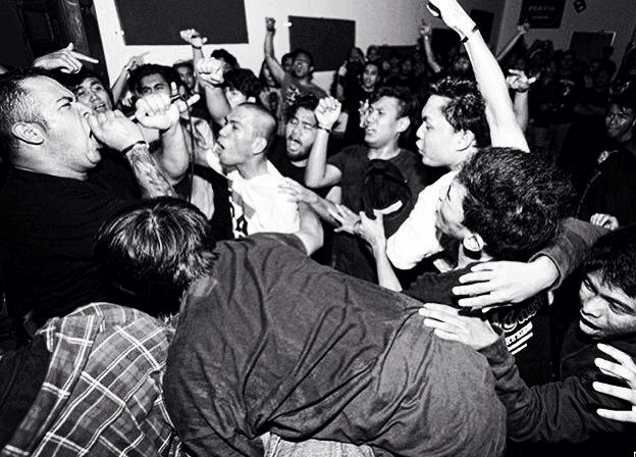
KGR: The new record was recorded with Arthur Resnick, normally you guys had always recorded Taylor Young. Was there any particular reason you wanted to do that (record with Arthur) or just for a change?
Brian: Basically yeah, just a change. We just wanted to mix it up, try something new. Plus we’ve been a fan of Arthur’s, musically and production-wise, for years, so we figured why not, let’s just try it.
We’ve gotten to Tailor for the past maybe 10 years. So this will be the first time since our demo and our very first full length – but even the first full length he had a hand in it because he actually remastered it and brought up some levels and remixed it a little bit. But yeah I’d say 10 years we’ve been with him and we just wanted to try something different like nothing personal, he’s still our boy, and he’s our guy too. We just wanted to try something different.
KGR: Was it a different experience? You guys have recorded with Taylor for so long, were there growing pains trying to do things differently or… How did it work out?
Brian: I wouldn’t say it was tremendously different but… We were in a different studio this time and it was like a fucking crazy nice studio – not saying that Taylor’s isn’t, Taylors got a great studio. But this place was like, I can’t even describe it. It looked like some place that Metallica would go. I guess a body count had recorded there, The Cavalera Conspiracy recorded last record there with Arthur.
At first, we were thinking about flying out to Philly to do it with Arthur. But then with like cost and budget, we’re just like, why don’t we just do it a little closer kind of meet in the middle, so to speak.
And Arthur was like “My LA studio that I normally rent out isn’t available but I got a guy in Arizona that I rent a studio from and it’s a really cool spot in Mesa” and it ended up being probably one of the coolest recording experiences I’ve ever had – like I said, no diss on Taylor, he’s our boy, I love recording with Taylor, and it’s convenient because he lives in Los Angeles, but going to Mesa and like… We got a hotel down the street from the studio, basically just kind of living together for six days I think it was, just staying there and we would be in the studio between 10-12 hours a day. And Arthur ended up just staying with us so that we were all together.
Just that kind of atmosphere of being around music and then going back and just relaxing with everybody, drinking, was just kind of a cool experience to be around – because then we’d be very proud of what we did accomplish for the day and then we’d go home and kind of like do a like a mini celebration of “fuck yeah”, just be ourselves especially with Arthur we always party with him, like outside of band stuff.
It was just a really relaxing experience because even John, who owns the studio just has a really cool setup like there’s the control room and then there’s the big studio, but behind the control room there’s like a kitchen and foyer area, like a gathering spot like a little living room – nice couches ,very relaxing…
Like the vibe was just right you know, like it was our kind of vibe to just chill out relax, fucking throw back some drinks, you know, and just get shit done, you know, like, just kind of handle it.
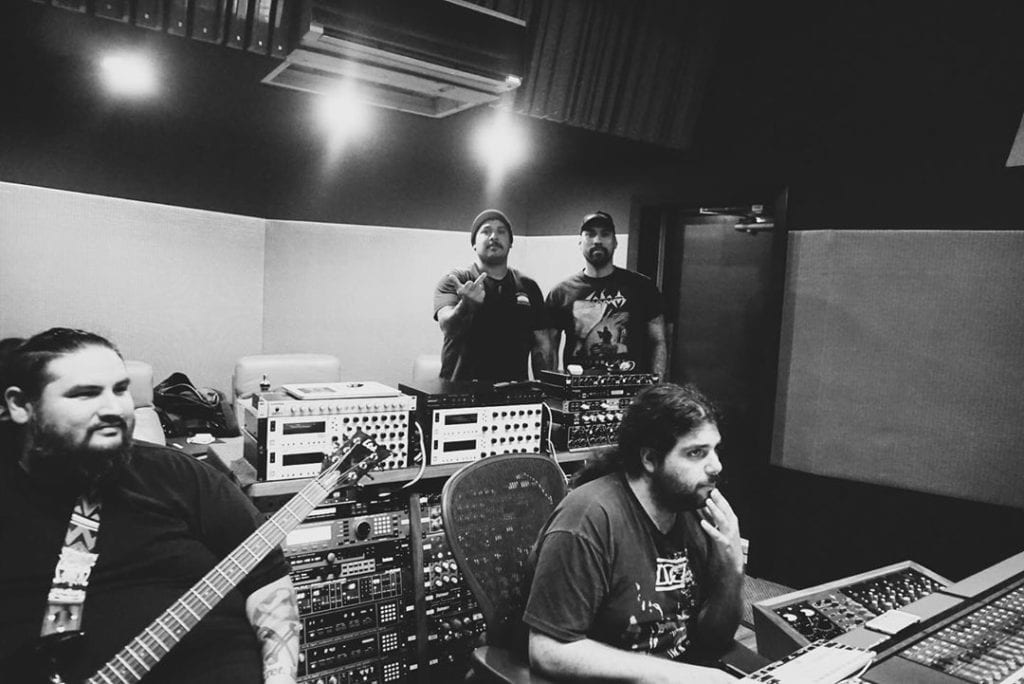
And Arthur was very sort of like.. I hate sounding like a douche like “ah he’s so professional”, but like, he’s very calming, he just has a very calming demeanor, and that helped out a lot too. He didn’t rush us, but he brought a lot of really good performances out of us without being like an asshole about it.
It was really cool, really great experience. I would definitely do it again. Like I said he’s a friend.
I think in the future it’d be pretty cool to like maybe collaborate with both Taylor and Arthur and get two guys from you know our shit and let’s see what happens. That would be pretty cool.
KGR: So there’s a couple of bands that are doing like doomy, reverby death metal but who are obviously people who are from hardcore or into hardcore. A band I think that kind of sounds sort of similar to what you guys are doing with the new record would be Gatecreeper who are a death metal band, but those dudes plainly listen to hardcore.
That said, there was a metal injection review of you guys record it said your record “amounts to pure death metal”, as opposed to being metalcore or hardcore influenced. What do you think about that?
Brian: I will say that it’s accurate. It’s definitely what we were going for.
But obviously, who we are, who Gatecreeper is, even Of Feather And Bone, Outer Heaven, those kind of bands – we all have hardcore punk roots, hardcore punk backgrounds. And that kind of trickles into that. Ours has been a little bit more explicit over the years, but there’s just always going to be that hardcore undertone or like, no matter what, there’s always going to be an element of groove that comes from New York hardcore that we love – it’s one of our hugest influences.
I will say, yes, but at the same time, subconsciously, that there’s always going to be a touch of hardcore in there. And no matter what, like look at Dying Fetus, they’re a pure death metal band, but you could obviously hear the New York hardcore influence in their music same with Gatecreeper you know all those other bands it’s just you know.
KGR: So do you consider Xibalba a more of a death metal band with hardcore roots or more of a hardcore band that’s gone in a death metal direction?
Brian: You know in in the past I would have said we were more of like a metallic hardcore with a lot of death metal and doom metal influenced and elements, but I would say now it’s the other way around.
I think we’ve always been trying to kind of find ourselves and I think we finally hit that plateau of where I’d say we’re like a death metal band with hardcore roots and influences. Yes, I’d say that.
KGR: I think part of that as well, like I grew up on punk and hardcore and as I got older, I’m 39 now, but in my early to mid 30s everything just went into metal because I just wanted things to be heavier and heavier, and I feel like that’s a common thing that happens with people. At least it’s not uncommon.
Brian: Yeah it’s definitely not uncommon. I think when bands progress, even if they’re not trying to go the metal route or whatever, it just kind of comes off that way.
I mean a part of growing is catering to different groups, some bands will start playing like more death or death metal or metal shows. One band that comes to mind that’s always been able to get respect across the board is Terror. They still tour but when they were doing it non-stop you would see them on like Chimaira shows, you would see them on these giant metal fest and like, you know, it wasn’t at a giant metal fest like only the hardcore kids showed up, it would be you know a fucking sea of people all kinds of people.
And I think they’re one of those bands that have been able to bridge that, but you would never say “oh man but they started to sound metal” or anything like that – they just kind of stood where they were in their hardcore realm they definitely got better over the years.
But I don’t know, it’s definitely a tricky thing bands becoming metal. It’s just part of the progression sometimes. And also just like whatever the fuck people are listening to, like some people like listen to different things at different stages of their life and it could just add to the influence and to what that records going to sound like.
KGR: It’s funny what you’re saying reminded me of This Is Hardcore videos, you see lot of bands like you guys which is hardcore dudes that play heavier stuff and people are dancing- and then you have a band like Young And In The Way – that’s a fucking metal band, and when they play blast beats people are like “I don’t know what to do” (laughs)
Brian: Haha yeah, like “where’s the groove? When’s the break beat gonna hit” (laughs)
KGR: Yeah I mean, that’s a killer band but anyway.
So the last two songs in the record, El Abismo Pt. 1 and El Abismo Pt. 2 – there’s a lot going on there. Was that a song that started as an idea and was fleshed out into a song, or was it song that just kind of grew and grew and grew into different parts?
Brian: The, like, melodic part, I wrote that maybe five years ago, five/six years ago, and I always kind of wanted it to be like almost like an epic, but I wanted it to be a little bit more… Like it’s epic like but I also wanted to be like where it feels like there’s a lot going on but there really isn’t, and just to kind of make it interesting to kind of throw basically all like everything that we love in like hardcore, metal, death metal, doom metal like just kind of throw everything.
Like at the beginning just starts very just heavy, and then that goes into the atmospheric kind of intro almost, and then into the somber like Corrupted “El Mundo Frio” stuff, and then the chorus is heavy again. Then it goes to more heavy doom metal.
And then it goes into part two, and then you hear that like kind of Crowbar esque like hardcore riff, and then it goes into this fucking groove ,and then a like Morbid Angel riff and then another doom (laughs)
Basically I’m like “just put like everything into a song and let’s just see what happens”.
But most of that song, I had riffs prepared for it, but a lot of that was put together like a week before, and then like actually just like… Because I had it divided up into sections and we would jam certain sections, but then when we got into the studio we just kind of just went with it and just whatever happened happened.
And so like half of it is, I won’t say improvise but it’s definitely like off the cuff you know, but yeah I definitely wanted it to be like an epic banger, you know.
KGR: Yes, I mean, it is – it’s a fucking incredible song man.
Brian: Yes, I just feel like you don’t think of too many power ballads that are just hard, that you want to fight somebody to while you’re crying about your lover (laughs). That’s essentially what I wanted is just like… just a ballad you can cry and beat the fuck out of your friend or something.
KGR: (laughs) that’s cool man. So let’s talk about some guitar specific stuff. I think I read somewhere that you started off on a Squier guitar but what I was curious was what would you consider to be the first like “real” guitar and amp that you bought? What was your first like big step up?
Brian: The first guitar I bought with my own money was an LTD Viper 50. I bought that with my own money, I got it for like $150 to $200 something like that. It was the first guitar I ever bought I was like, fuck, I was 20 years old maybe.
And like you’re saying, the first guitar I had like was a Squier, but the first one that I bought was that LTD and I use that up until a couple years ago, maybe the last three years I’ve been using an LTD Baritone that a… I don’t know, a Viper 250 Baritone or something like that.
(We spoke about this later, it was a Viper 201b – “I basically got the cheaper one and installed an EMG in it like the 400 model lol (81/85 set). It saved me a few hundred to do that”)
I basically got that from an ESP LTD endorsement that I got, and so I’ve been using that one for the past couple years. That’s the one that I use on this record. It’s great guitar like definitely like the first, LTD was probably the first (real) guitar that I ever bought.
And then amps – I would actually borrow my cousin’s amp, which is a 6505 Plus, because he lived within a couple miles of me and we played it in an old hardcore band like back back in the day and so he left it there. And then he would take it, but then like for shows, I’m like, hey, do you mind if I borrow the amp and he’s like yeah, that is fine. So he let me borrow it.
Eventually, he focused more on school, and just left it at my house. And I just kept using it using it, eventually, he was like “you could just have it man, don’t worry about it”.
KGR: Is that the amp that you’ve used for a lot of Xibalba stuff?
Brian: We use that head for the first full length, the Madre Mia stuff, but everything after that we used just whatever was in Taylor (Young)’s house. I know that he has a 5150 which is almost the same thing. And I know on Hasta La Muerte and Tierra we used the 5150 which is same head that I have, we used an Orange, we used a Sun Model T. We used a Marshall JCM and a Mesa, a Mesa Dual (Rectifier) I think. We just combined those to come up with the tone and we used that whenever I would record with Taylor.
And then I don’t remember what amps we used when we recorded with Arthur. I know one of them was a Morin – which I had no idea what Morin was. But it ended up that and some other head I fucking forgot. I got to ask Arthur for the specifics.
(Brian checked with Arthur later, it was a Morin and a Mesa Mark V)
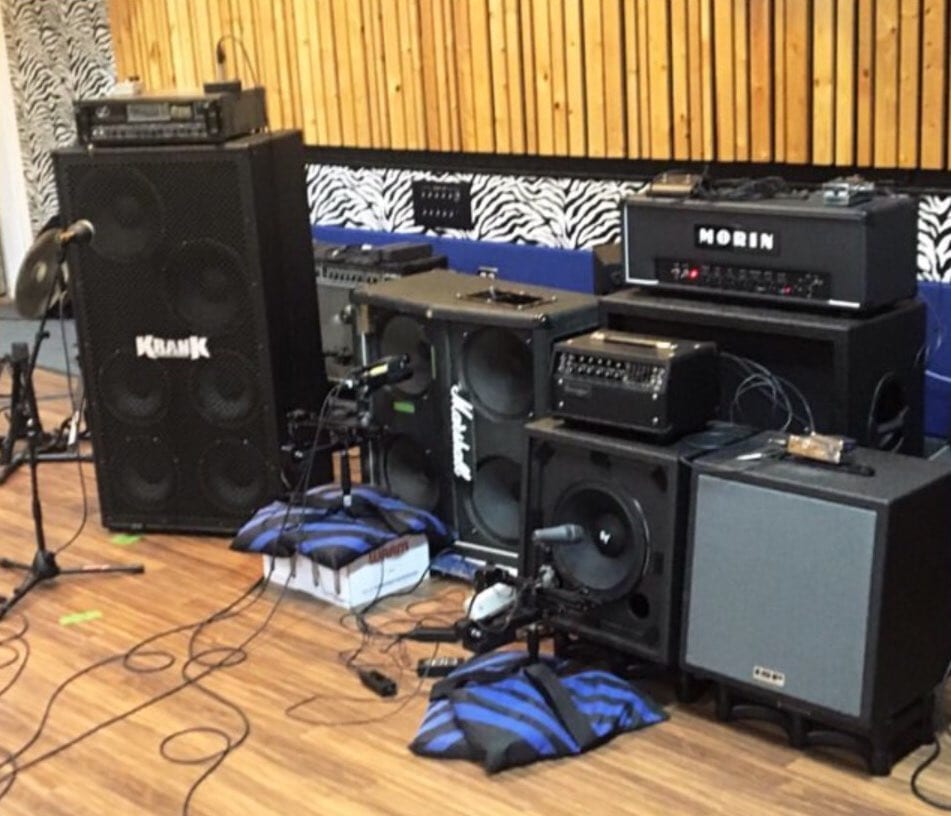
But yeah, he somehow came up with some fucking crazy ass fucking tone that like (laughs) I was like “this is exactly what I wanted” and that was the exact words that I used was like, “yo I want this to be huge without having to like keep layering guitars to make it sound huge”. We layered it but not as much as we normally would have done and it fucking sounded great.
And then with that tone, I told him specifically, like, because he’s like, “do you have any points of reference?” I’m like, yes, if you can mix the Hasta La Muerte tone with Obituary’s Cause Of Death, like the dirtiness of that tone, how dirty that shit is. And then but also how heavy and thick the tone on Odd Fellows Rest is, like Crowbar, if you can like mash all those three in there, I’ll be happy – and then fucking he surpassed it like I was like yes.
KGR: Amazing. The other thing, from looking through pictures I saw that you typically use an emperor cab?
Brian: Yes. So I use an emperor cab. It’s actually right next to me. We don’t use that one so much live anymore because Nathan has these two Omega cabinets that are 6 x 12 that we use so those ones that have been the ones that are our go tos that we’ve been using the past couple years playing locally, those are the ones that we’ve been using. But if it’s like a smaller show nearby or whatever then I’ll load up the Emperor and I’ll use that.
So the Emperor and the Omega cabs, good cabs, I mean, in my opinion. I’m not too much of a gearhead like that, but to me, they both are very similar, you know, and how they push out that sound.
KGR: So you went from the Viper to the baritone – you never considered using a seven string?
Brian: Nah. I did, but you know, I’m a fucking creature of habit and like, adjusting to the baritone neck was, it wasn’t hard but it was different than using my normal one. I’m sure I could get used to doing a seven string, but I’m just like, you know what man I like where I’m at, like, why change.
And I’ve never been like one to fuck around too high on the neck or like, you know, I’m kind of basic when it comes to that shit and I’m just like I’m just going to just do what I know.
And then who knows. I mean, somewhere down the line my mind could change and then I’ll you know, start going seven strings, but like (laughs) I already have like fucking trouble paying attention to shit, so like doing like the seven and eight string shit like it just doesn’t seem like I could do that. (laughs)
KGR: You must be running pretty thick strings on the baritones. You know what they are?
Brian: Not as thick as you would think. But so what I do is ironically enough, I use a seven string pack.
KGR: And you get rid of the first string?
Brian: I just get rid of the smallest string. It’s a 59 gauge is the thickest. And then the smallest one is, I think 10 or 11.
KGR: I literally just bought a seven string last week and the seven string pack I got, the D’Addarrio XLs.
Brian: Oh yeah, the XLs.
KGR: If you’re getting rid of the first string you’d be 13 to 59.
Brian: I actually have them right here (holds up pack of XLs – 10-13-17-26-36-46-59). I been using these ones.
KGR: Same ones. I put those on the 7string and it feels like… At the end of the day the first string is only a 10 and I’m used to that, but the low string on this feels like I’m playing fucking telephone cables. You know what I mean.
Brian: Yeah yeah yeah. It’s different but it’s something that I’ve just grown accustomed to. I’ve been literally using the same strings since 2009. Like, I’ve never used anything other than these, maybe here and there I use whatever was available, but I’ve been using these staunchly for fucking 11 years or so. And yeah, I should probably hit them I’ll be like, yo, motherfucker give me a fucking sponsorship (laughs)
KGR: (Laughs) yeah. So you have you have a new, I guess it’s not new because I think you started it towards the end of last year, but you have a new project, Tzompantli, tell me about that.
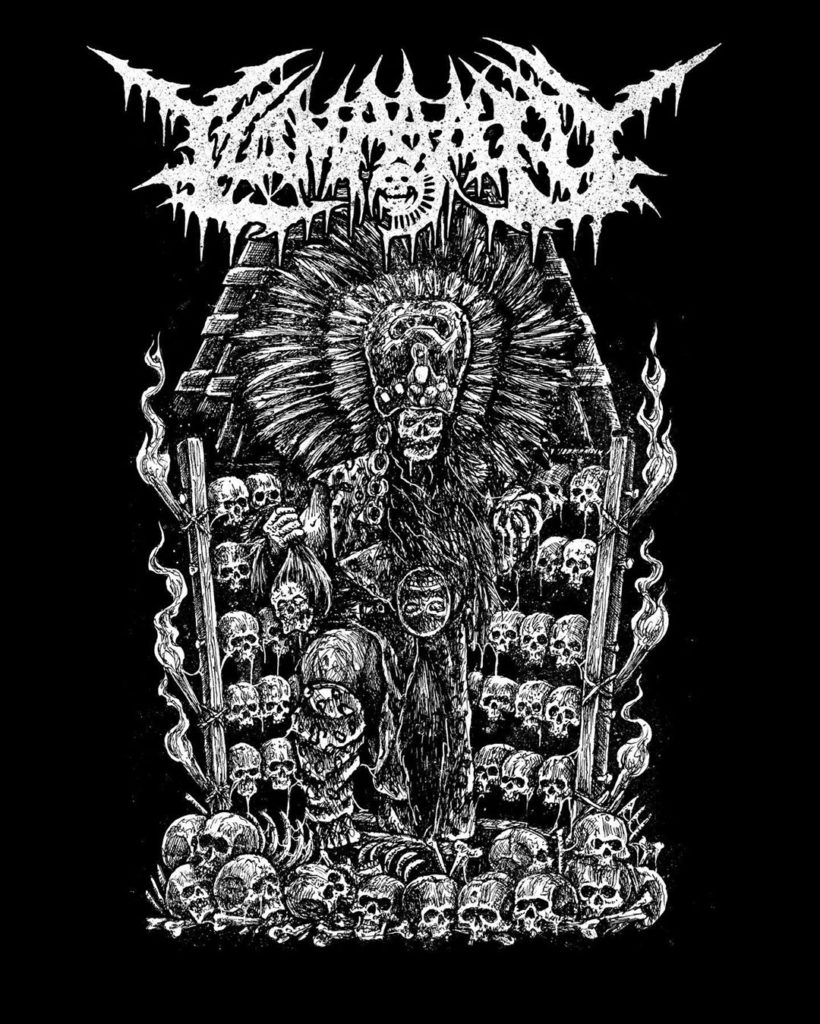
Brian: That’s just a solo thing that I like I wanted to do. Basically how Xibalba is, how we throw our culture in there and stuff like that, you know, this is a little bit more explicit and a little bit more like, I guess almost like a concept. Like it’s a concept for like, the Aztecs, the Mexica people.
It’s a little bit more… That’s all that I plan on the lyrics being about or like using traditional folk instruments from that culture. So it’s a little bit more explicit in like the culture stuff. I’m just trying to take different influences and then mix them together whereas like, you know, Xibalba is like the Morbid Angel, the Crowbar, the Sepultura, and New York hardcore, and then like some doom.
This basically takes different influences that I had and just kind of does the same things. When I just try, I want to be like a Disembowelment and Mortician rip off and a little bit more funeral doom.
So yeah, basically it’s what it is. I haven’t really changed too much and like some of the riffingstyle. But I sing on it so like it’s just pure like cavernous almost and I recorded everything in this room. So it’s a very raw lo-fi, you know.
But I basically finished writing like a full length for that like right before Años dropped. So I think hopefully, by the end of the year, I could record a full length for this project. I’m still trying get concepts, so some of the stories put together and put into lyrics, get a layout of the record planned.
But like Años dropped… Because like that live stream we actually recorded that a week before we actually put it up so, it’s not live everybody, sorry (laughs) I mean it’s recorded live, I mean it is a live performance it just wasn’t live like in the moment. That’s why we were able to like chat because we were all on and we were chatting with everybody. That’s why like they’re like, “I wonder why they’re able to chat and play at the same time” (laughs)
But yeah, that was the last time I picked up my guitar just because with Años coming out and like, like once Años dropped… I was already done writing a full length for my other project. Like the record that we’ve been working on for five fucking years just dropped I just kind of felt like, “God Damn man like, fuck this shit, I don’t want to fucking play it no more.”
You know, it’s like the pandemic too. And like, I mean, the whole pandemic thing. Like, that was the start of me like actually finishing the Tzompantli stuff because like we’ve been locked away. I wouldn’t go out of the house. So I just like fuck, man. I was writing stuff and once I felt like I was done, and Años came out, I was just like, yes, man break time.
So I haven’t touched my guitar yet, man. But like I said earlier, I’ve been getting that itch because me and Jason have been bouncing ideas off of each other.
And then it’s a brand new string pack that I bought the other day. So like, I’m like “yo I got to put these on”. And then you know, actually, I don’t even want to say the other day. I bought these like, I want to say about a month ago because I was like, you know what, if I buy the strings, I’m going to want to put them on. And then like once I put them on just from tuning and just getting the sounds I know I’m going to start playing (laughs)
KGR: Get that new string feel man (laughs)
Brian: But it didn’t happen like… Fuck, whatever. So I’m on vacation right now, just chilling out (laughs)
KGR: I like that you’re doing the concept record. I only moved to the US a couple years ago but the thing for me that really stands out about California, like California hardcore and California music as distinct from the rest of the country is like all the rest of music in the country is just super fucking white. California is like much more diverse and much more of a mix of people you know.
Brian: Yeah, California is a different thing. Because like, yeah, there’s a lot of white male dominated kind of scenes out there. And like when I was coming up in a lot of the hardcore shows like, it was predominantly white. Over the years, it’s definitely… It’s obviously like a mixture now.
But I would say, there’s definitely more brown people now in metal because like, metal was the same thing. It was white dominated, because a lot of brown people in the hood didn’t really have access to it or even care.
But like, in the late 90s I think, in metal, brown people just kind of surpassed it. So like, when you go to a metal show in LA, it’s brown dominated, you know, and of course there’s a lot of white people too, but like I said, it’s just where you’re at basically. It’s just a big melting pot of different kinds of people and it’s pretty cool. It’s pretty cool that the hardcore is like that too.
KGR: So last thing I was going to ask you about was your YouTube channel. Tell me about that.
Brian: So basically that’s just something that like I wanted to do to kind of give like reviews, and not just like… I’ve seen reviews, where people can just like dismantle the whole record, and just go a little too hard on the band.
And me being in a band I can see how that’s kind of fucked up because my thing is like if I don’t like something then I’m not going to give it any kind of any more attention than me just listening to it. I’m not going to go bash that shit, I’m not going to talk shit on it and there’s just too many of these You Tuber dudes that try to like flex their knowledge, flex their collections. But at the same time just like talk shit on records, and disguising that shit as critiquing but it’s like “man now you’re talking shit about that”.
But me, I’m only going to review shit that I like. I’m only going to give stuff that I like the time of day, and I want to, not really flex my collection because I don’t have like a giant collection, but just when I buy that physical copy, that’s what I’m going to do a review of – I try not to do like a review of stuff that I don’t have the actual physical copy of.
And then I’ll also, as cheesy as it sounds just be a little bit more of a positive force. And, like, I talked to one of my friends, he put it into a really good perspective, because I was thinking about not really doing it anymore. He’s like, “no, you should keep doing it. Because think about it, like people like your music. Of course, they’re going to want to know what you’re listening to. Why don’t you use that to kind of just boost other bands up and just let them know hey, this is a cool band. They sound fucking cool. Like go listen to them.”
And you don’t need some crazy articulated “Music Review” like, those are for when you’re reading about a band. I love those when you’re reading about a band that has like some crazy ass articulated fucking description but when you’re hearing somebody speak it’s a little different.
I try to be as basic as I can, so I that’s why I call it the “unarticulated reviews” because like just like, “shit’s fucking sick but go fucking check it out. It reminds me of this, it reminds me of that, fuck yeah, cool. (laughs) Lotta atmosphere, it’s heavy, fuck yeah go listen to it (laughs).
You know that’s basically what I do just to kind of like simplify it and just get to the point. “I fuck with it, it’s cool”.
KGR: I mean that makes sense. I like Banger TV, the Canadian guys who do record reviews. There’s that one guy the comedian guy. He’s fucking hilarious
Brian: Yes, he’s great.
KGR: And then there’s Brad (Zorgdrager) who, speaks reviews like he would write a review and it’s kinda weird because he uses like
Brian: His big words, his big words.
KGR: sentences and it’s like you would never speak to another human. You know what I mean.
Brian: He’s definitely like, the antithesis to what I do. And like shout out to Brad because I love Brad. He’s my boy. But basically like how creative he is with words like, fuck man, I’m not that creative with my words. So I was like, I’m going to do the complete opposite
“This is just fucking sick, go fucking check it out. You know, like, I fuck with a cool, man. It’s definitely cool. Listen to it.”
KGR: Yes. Well cool, man. That’s all I had. Thanks very much for taking the time to speak to me. I really appreciate it.
Brian: Yes, man. I appreciate you man. Thanks for asking me.
While you’re here, check out our list of best metal guitars, plus our interviews with Tom Smith of The Acacia Strain and the dudes from Frozen Soul.

